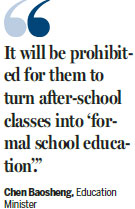|
Parents pick up their children near the entrance of the Shijia Experimental Primary School in Beijing. Zou Hong / China Daily |
Education chief: Parents should be freed from struggle to pick up kids
Education Minister Chen Baosheng has pledged that the nation's primary and middle schools will be allowed flexibility in setting the time they end their classes, in a bid to free parents from the burden of picking up their children during working hours.
"Many parents have told me it has become a major concern for them and even grandparents to pick up children after school on time," Chen said at a meeting with members of the National Committee of the Chinese People's Political Consultative Conference, the top political advisory body.
The school day generally ends between 3:30 pm and 4 pm, so parents usually think about leaving the office to pick up their children, and subsequently cannot focus on their work, he said.

The ministry will release a policy plan to allow schools to carry out flexible scheduling. The plan will clarify that after-school classes are not considered part of compulsory education, and allow schools to charge extra fees in agreement with parents. The government can provide some subsidies to such after-school programs, according to the minister.
"It will be prohibited for them to turn after-school classes into 'formal school education'," he said.
The Ministry of Education released a regulation in 2013 banning schools from adding extra classes, to reduce students' workloads in elementary and middle schools.
Some local education commissions further reduced school hours and cut students' workload to ensure they have enough time to play and sleep.
Given this, students leave school between 3:30 pm and 4 pm. No after-school classes or programs are provided at school. However, private training programs are not banned.
Ending classes at these times caused parents to spend money sending their children to private classes after school, said Liu Jizhen, a CPPCC National Committee member and an academician of the Chinese Academy of Engineering. "The outcome is that the workload at school has been cut, parents' workload has increased and children's workload remains the same," he said.
"The policy to reduce students' workload aims to reduce unreasonable work," said Zhong Binglin, a CPPCC National Committee member and president of the Chinese Society of Education.
The government has done its duty by releasing these policies. But parents still fear that their children will fall behind in their studies, and continue sending their children to after-school classes at private training institutes, he said.
"Education is related with other public issues. Successfully reducing students' workload involves changing public opinion, as well as joint action from schools and parents," Zhong said.
